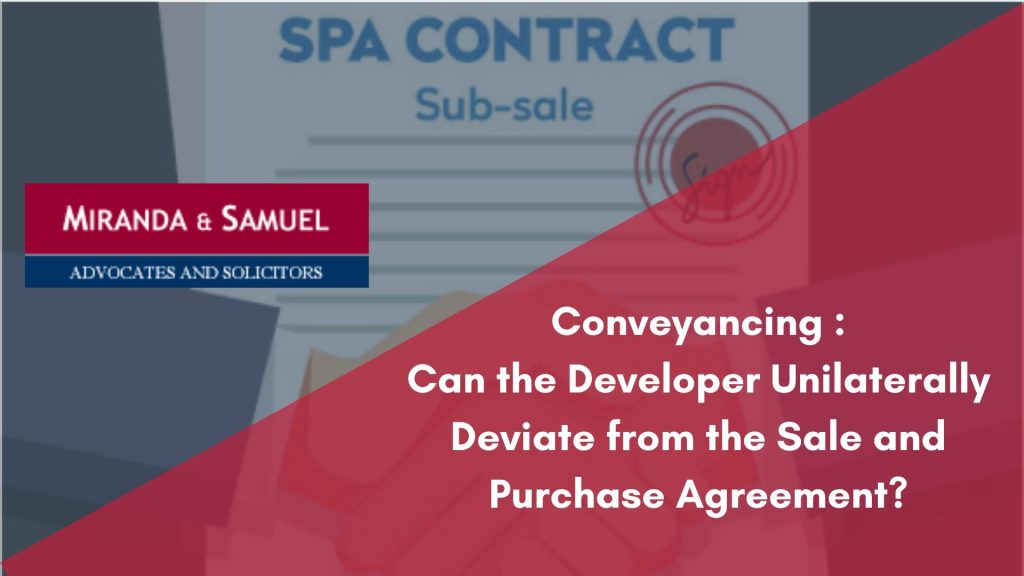Developers sometimes deviate from the SPA’s. Does the law give Developers wiggle room to deviate from the SPA’s.
In this case, the Sale and Purchase Agreement (“SPA”) stipulated that the Developer shall install a centralized air conditioning system (“CACS”). However, the Developer unilaterally deviated from the Approved Building Plan of the strata development and installed outdoor compressors for split unit air conditioning within the indoor build up area?
Would this amount to a ‘defect’ under the law? Can the Developer be successfully sued for such ‘defect’?
If so, what is the remedy required from the Developer?
This issue has been resolved in the recent Court of Appeal case of Lakefront Residence Sdn Bhd v Tribunal Tuntutan Pembeli Rumah and Wong Boon Leng [2023] 1 LNS 2146 where the Court stated that “the duty to deliver Vacant Possession for quiet and safe enjoyment of the parcel falls squarely on the Vendor’s shoulders. It is sorely unimaginable for any person to safely dwell in its own home when the Vendor had installed machinery specifically designed to be installed outdoor, within the indoor built-up area of the parcel.”
Facts
In this case, the SPAs entered between the housing developer, i.e. the Appellant and the purchasers, i.e. the 2 nd Respondent, provided for the installation of a CACS without having to install any outdoor compressors within the indoor area of their units under the approved building layout plan dated 23 March 2012. However, the Developer had amended the SPAs approved plan with another plan dated 31.7.2018 unilaterally and without the purchasers’ prior consent. With the amendment, the CACS was replaced by a split unit air conditioning system.
This has caused some problems as the building was originally designed with the intention to install the CACS, thus, their design never included an outdoor ledge which is typically constructed for strata development with split unit air conditioning units. No solutions were provided by the Developer to install the outdoor compressors for the parcels. Instead, the Developer merely installed the outdoor compressor units in an indoor portion of the “Yard” which was also the parcel’s kitchen area.
After accepting delivery of Vacant Possession, the purchasers reported the installation of the split unit air conditioning system as a defect during the Defect Liability Period (“DLP”). A meeting has been held by the Developer with the Lakefront Residence Owner’s Association subsequently and an admission letter was issued by the Developer admitting that the Developer had unilaterally changed the CACS to the split unit air conditioning system without first obtaining the purchasers’ consent. Although several options were proposed by the Developer but none of it enabled the purchasers to relocate the outdoor compressors outside the parcels’ indoor areas. The purchasers therefore had no choice but to relocate the outdoor compressors at their own loss and expense. The purchasers then filed a claim at the Tribunal for Homebuyer Claims (“Tribunal”), i.e. the 1 st Respondent, to recover the relocation costs from the Developer which was eventually allowed by the Tribunal. Dissatisfied with the Tribunal’s decision, the Developer applied to the High Court for a Judicial Review and Certiorari to quash the Tribunal’s decision.
High Court Decision
The Learned Judge dismissed all of the 4 Appeals by the Developer on the following grounds:
(i) the Tribunal had not exceeded its jurisdiction as the SPA is referred to the SPA’s Approved Plan (which provided for the installation of the CACS);
(ii) the Developer had admitted in its own Admission Letter that the initial promise under the SPAs was to install the CACS and it was an unilateral decision made by the Developer to change it to the Split Unit Air Conditioning System without first communicating to the purchasers; and
(iii) the Tribunal Claims were well within the time limitation as it was commenced even before the expiration of the Defect Liability Period.
Decision of the Court of Appeal
The Developer then appealed to the Court of Appeal on two issues:
Issue 1 – Whether or not the Learned Judge was right in finding that the Tribunal’s claims were not time barred; and
Issue 2 – Whether or not the Learned Judge was right in finding that the Tribunal had not gone beyond its jurisdiction under Section 16N (2) of the Housing Development (Control and Licensing) Act 1966 (“HDA”).
Section 16N (2) of the HDA
Section 16N(2) of the HDA provides that the jurisdiction of the Tribunal is limited to a claim that is based on a cause of action arising from the SPA entered into between the Developer and homebuyer which is brought by a homebuyer within twelve (12) months from:
(a) the date of issuance of the certificate of completion and compliance;
(b) the expiry date of the Defects Liability Period as set out in the SPA; or
(c) the date of termination of the SPA by either party.
Issue 1
Although the Developer argued that the hazardous installation was not a defect against the parcels, however, there was absolutely no legal authorities furnished by the Developer to prove that such hazardous installation of the outdoor compressor was not a ‘defect’. Whereas, the purchasers’ case clearly falls within the ambit of the Defects Liability Period Clause under Clause 29(1) of the SPAs “the said parcel or the said building … not having been constructed in accordance with the plans and description as specified”.
It was found by the Court of Appeal that by installing the hazardous indoor split unit ACs and outdoor compressors within the indoor area of the purchasers’ units, it was undoubtedly an infraction in that the parcel was not constructed in accordance with the Approved Building Plan of the SPAs. Therefore, there was a defect falling within the ambit of the DLP clause in that the Developer had unilaterally deviated from Building’s Plans and Description without the consent of the purchasers especially by not installing the compressors in compliance with the safety specifications prescribed by the manufacturer. By reporting such defect within 24 months after taking vacant possession, the Court of Appeal has affirmed the High Court’s decision that the purchasers’ claims were not time-barred.
Issue 2
As for Issue 2, the Court of Appeal again affirmed the High Court’s decision that the Tribunal had not gone beyond its jurisdiction under Section 16N (2) of the HDA as the installation of a CACS was within the SPAs. Although the Developer has argued that the term for the installation of a CACS was in the Deed of Mutual Covenant, nonetheless, the Court found that the said term was indeed a term within the SPA itself and even if the term for CACS was only contained within the Deed of Mutual Covenant, such term may still be read into the SPAs as it can be considered as one and the same transaction. Thus, when the Developer had unilaterally deviated from the promised to install CACS, the Developer has directly breached and transgressed against the SPAs.
Key Points to Take Note
1. Developers should note that the Court of Appeal has continued the trend of upholding the purpose and objective of the HDA which is a piece of social legislation to protect house buyers and interpreting the Act to ensure maximum protection for the house buyers against
the Developers.
2. In line with the case of Toh Shu Hua & Ors v Wawasan Rajawali Sdn Bhd [2023] 2 CLJ 310, the Developers are once again reminded to not deviate from the terms of the SPAs. If circumstances arise in which modification of the SPAs term is necessary, the Developer should always first communicate such modification to the purchasers and obtain their consent before deviating from the SPAs. If not, the purchasers have a right to claim for compensation under Defect Liability Period Clause within the SPAs. Also, it should be noted that the statutory SPAs for residential properties are regulated by the HDA which prohibits Developers from amending the terms unilaterally, or else they may commit an offence under the HDA.
By George Miranda, Joy Sam Jia Qian, Kong Chai Yin
This article is for general information purposes only and does not constitute legal or professional advice. It should not be used as a substitute for legal advice relating to your particular circumstances. Please note that the law may have changed since the date of this article.





